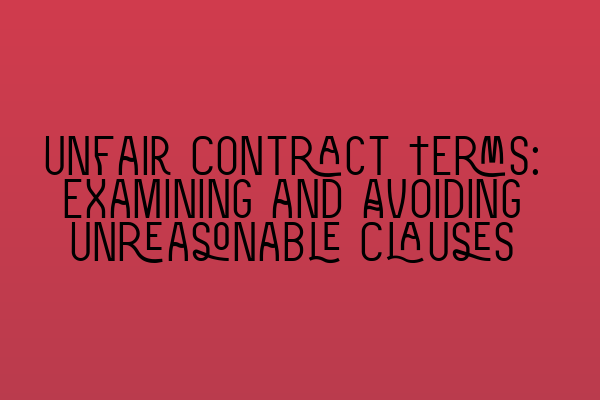Unfair Contract Terms: Examining and Avoiding Unreasonable Clauses
Welcome to SQE Contract Law, where we provide comprehensive information and insights into various aspects of contract law. In this blog post, we will delve into the topic of unfair contract terms, examining the significance of unreasonable clauses and how you can avoid them. Before we proceed, make sure to check out our related articles below for further reading:
- Interpreting Contractual Clauses: Unlocking the Hidden Meanings
- Contract Law Tutorials: Simplifying Complex Concepts for Students
- Discharge of Contracts: Modes and Consequences Explained
- Exploring Third Party Rights in Contract Law: Implications and Boundaries
- Contractual Obligations: Navigating the Responsibilities of Parties
The Importance of Fairness in Contractual Clauses
In contract law, fairness is a fundamental principle that ensures the protection of parties involved in an agreement. Unfair contract terms, on the other hand, can tilt the balance of power in favor of one party, placing the other at a significant disadvantage.
To maintain a fair contractual relationship, it is crucial to understand what constitutes an unreasonable clause and how it can impact your rights and obligations.
Identifying Unreasonable Clauses
Unreasonable clauses are provisions within a contract that can be considered oppressive, deceptive, or overly beneficial to one party. These terms usually limit or exclude the rights of the weaker party, absolve the stronger party from their responsibilities, or create an unfair distribution of risk.
Common examples of unfair contract terms include:
- Excessive penalties or charges
- Unilateral right to terminate the contract
- Unreasonable limitations of liability
- Unfair distribution of risk
- Unjustified extensions of timeframes or deadlines
By recognizing these unfair clauses, you can protect yourself or your business from potential exploitation or harm.
Avoiding Unreasonable Clauses
When entering into a contract, it is essential to carefully review and negotiate the terms to ensure fairness and equity. Here are some key steps to avoid unreasonable clauses:
1. Read the Entire Contract
Do not skim through the contract; instead, read it thoroughly to understand all the terms and conditions. Pay particular attention to clauses that limit your rights or impose excessive obligations on you.
2. Seek Legal Advice
If you are uncertain about any clause or its potential consequences, consult a qualified solicitor. They can provide expert guidance and help you navigate complex contractual arrangements.
3. Negotiate Amendments
If you identify unfair terms, negotiate with the other party to amend or remove them. This can be done through direct communication or with the assistance of legal professionals.
4. Consider Alternatives
If the other party insists on including unfair clauses, evaluate whether it is worth proceeding with the contract. Sometimes, it may be more beneficial to explore alternatives or seek business relationships elsewhere.
By employing these strategies, you can significantly reduce the likelihood of being trapped in an unfair contractual arrangement.
Legal Remedies for Unfair Contract Terms
If you find yourself bound by unfair contract terms, there are legal remedies available to protect your interests.
One option is to challenge the validity of the unfair clauses in court. Judges have the power to declare unreasonable terms unenforceable, effectively removing them from the contract.
Additionally, consumer protection legislation, such as the Consumer Rights Act 2015, offers safeguards against unfair contract terms for consumers.
Conclusion
Unfair contract terms can have severe implications on your rights, obligations, and commercial relationships. By identifying and avoiding unreasonable clauses, you can safeguard yourself or your business from potential harm.
Remember to always read contracts carefully, seek legal advice when unsure, negotiate fairly, and consider alternatives if necessary. By doing so, you can ensure a more equitable and secure business environment.
For more valuable resources on contract law and related topics, be sure to explore our related articles:
- Interpreting Contractual Clauses: Unlocking the Hidden Meanings
- Contract Law Tutorials: Simplifying Complex Concepts for Students
- Discharge of Contracts: Modes and Consequences Explained
- Exploring Third Party Rights in Contract Law: Implications and Boundaries
- Contractual Obligations: Navigating the Responsibilities of Parties
